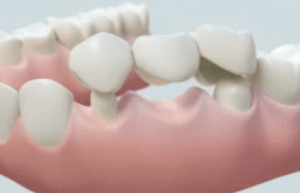Tooth loss is quite common. In fact, the average adult in the United States is missing five permanent teeth. The number is even higher among older adults and current smokers. Other conditions like poor oral health, teeth grinding, and gum disease also contribute to premature tooth loss. One of the best solutions for tooth loss is a dental bridge. Here are the pros and cons of dental bridges.
Despite the prevalence of tooth loss, many people hesitate to replace them. This reluctance isn’t entirely misplaced. Until recently, the only options were ill-fitting, artificial dentures or costly dental implants. But exciting new advances in dental bridges give these patients more options than ever before.
What are dental bridges?
These incredibly natural-looking implants fill in the gaps caused by missing or broken teeth. Generally speaking, individuals who just have one or two missing teeth are good candidates for this procedure. The patient also needs to have good overall oral health. Specifically, the teeth on either side of the gap must be healthy. Ft. Lauderdale dentists can use several different types of bridges including:
- Traditional: This type of dental bridge is the porcelain crown that many people are familiar with. In many cases, a traditional bridge is not much more costly or invasive than an extensive filling.
- Cantilever: This option may be available for people with only one healthy tooth adjacent to the gap. It supports the artificial tooth at only one end. Attractive and stable cantilever bridges have no visible metal abutments and last up to ten years.
- Maryland Bond: Experienced Ft. Lauderdale dentists do not use Maryland Bond bridges very often. The somewhat complicated procedure involves fusing plastic teeth onto a metal frame.
Dental bridges are not just cosmetic procedures. A missing tooth puts excess pressure on the remaining teeth. That imbalance significantly increases the risk for gum disease and tooth decay. Moreover, the added pressure often causes the jaw to recede.
Pros and cons of dental bridges
Stable and strong dental bridges from an experienced Florida dentist can last up to 15 years. That’s one of the most significant pros. Some other pros and cons of dental bridges include:
- Speed: Dental bridges usually require only two office visits. Also there’s no recovery time or significant lifestyle restrictions.
- Price: Dental implants are usually the best solution in these cases. However, as mentioned above, the procedure is highly invasive and rather costly. Especially since dental bridges often last more than a decade, they are quite cost-effective.
- Aesthetics: Many Floridians get dental bridges if they are missing teeth. The bridges usually make your smile much fuller and give your mouth the natural, contoured shape it has been missing.
There are also some cons. Some dental bridges can be difficult to clean. Moreover, there is a slight risk of nerve damage to the worked-on or nearby teeth. If these cons are a significant problem, there may be alternatives available. For example, your dentist may mount mini-implants with small screws instead of titanium posts. The result is often a dental implant-looking mouth at a fraction of the cost.
If you have just one or two missing or damaged teeth, a dental bridge may be the solution you’re looking for. To make your mouth healthier and get your smile back, contact Dr. Stone today. We offer convenient dental financing.
https://www.nidcr.nih.gov/research/data-statistics/tooth-loss/adults




